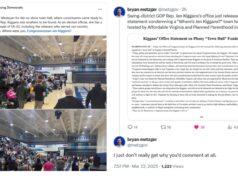I have spent most of the past four years educating and assisting consumers with healthcare insurance access and decisions. My social science background includes a BA in Economics from the University of Richmond and about three decades with one of the largest international non-profits: the United States Marine Corps.
When I retired from the Marine Corps, I didn’t give health insurance a thought. Then well before these last four years I began volunteering with Remote Area Medical (RAM), inspired by another former Marine, Ken Bernstein. I met Ken blogging on Lowell Feld’s Raising Kaine during the Jim Webb campaign. RAM inspired my curiosity about healthcare access in my America.
Introduced to Wendell Potter at a RAM clinic in Wise, Virginia, he interviewed me about the then Republican effort to dismantle the Affordable Care Act. Curious, I read his book “Deadly Spin: An Insurance Company Insider Speaks Out on How Corporate PR is Killing Health Care and Deceiving Americans.“ I followed that with Elisabeth Rosenthal’s “An American Sickness: How Health Care became Big Business and How You Can Take it Back.”
I was and continue to be aghast.
There are so many ingrained cultural misconceptions about the medical industry of our economy. Too many of my fellow Americans base their decisions on information shaped by those whose interest is far from theirs. There is a skillfully crafted political argument that consumers in my part of America weigh heavily about a decision that is far, far from political.
Somehow there are Americans out there, millions of them, who are willing to sacrifice the lives of their fellow citizens to prove that if you can’t afford healthcare, you don’t deserve healthcare.
I find myself working to convince the people who others are willing to let die that they really don’t have that obligation. Here are some of the points I make when I get the deer in the headlights look from consumers and it’s time to engage them in a little critical thought:
- First, there is no free market solution to healthcare when market entry and exit on the demand side are not always an option
- When insurance companies offer healthcare coverage they are wagering that you are going to be healthy or can be discouraged from seeking healthcare during the policy term; if you remain healthy and/or away from your doctor, the insurance company wins
- When you purchase health insurance you are wagering that you are going to be deathly ill during the policy term; if you remain moderately healthy, you lose your bet
- The alternative is to bet with the house (don’t insure) and risk bankruptcy if you lose the bet … the insurance company has no risk at all when you don’t insure
- We are all in the same risk pool: if you are uninsured, the medical provider charges the covered consumers for your care and that increased cost is passed through the insurance companies to those covered by raising premiums justified by the medical loss ratio: healthcare is never free
- When your insurance coverage offers you incentives to remain healthy, it is not because some enlightened corporate culture gives a crap about you
- Insurance policies are crafted to discourage claims by using co-pays, coinsurance, deductibles, and out-of-pocket shares
- The price of a health insurance policy is not directly related to the value of the policy: more expensive coverage often just means more expensive coverage and sometimes less value (thank you Thorsten Veblen)
- Health insurance agents and brokers have a personal financial incentive to sell you policies
- Health insurance agents and brokers are groomed by the companies they represent; they often believe what they tell you
- Health insurance agents and brokers represent the companies with which they are affiliated not the consumers; look for your name on the office door/sign
- If the health insurance company can delay approval of a treatment, pharmaceutical, or procedure long enough that the consumer becomes discouraged and/or dies, the health insurance company wins
- If you suspect you will be hospitalized during the term of your health insurance policy, it is very likely the best financial decision to purchase a policy with the absolutely lowest premium given your hospital is in-network
- Your hospital and/or practitioner receives different rates of reimbursement from different health insurance companies and coverage and have different reimbursement reputations … why does your practitioner accept which insurance?
- Health insurance companies give your physician(s) more “presents” than you do
- Physicians fell hook, line, and sinker for the “pain is the fifth vital sign” opioid scam pulled by big pharma; they should pray their moral deficit was worth the dinners and freebees
- Not-for-profit does not mean not-for-financial gain … it only means not-to-be-taxed
- In the long run, health insurance companies have no incentive to hold down costs; a higher medical loss ratio is rewarded with larger allowed margins and CEO pay
- Health insurance companies raise holy hell if physicians wave co-pays; think about that
- Unemployment Insurance may be just enough income to disqualify you for Adult Medicaid … and move you into Federal Marketplace eligibility
- If you take a job or receive a raise and become ineligible for Medicaid and/or unemployment insurance, your healthcare costs often increase more than your new income
- When you lose Medicaid there is a good chance you will have to find new healthcare providers
- Medicare for all is a meaningless mantra … at least you better hope so because if you are really ill and on Medicare, you probably can’t afford to be
- Almost no doctor has taken an upper level finance or economics course
- When a doctor starts a discussion about the pharmaceutical to prescribe by raising your health insurance formulary, you probably aren’t getting the best drug for your ailment
- Medicare Advantage is not actual Medicare and enrolling can eventually result in a loss of coverage for pre-existing conditions, making it really Medicare Disadvantage
- Your choice of health care insurance is a financial not a political decision
- Medical cost share schemes are not healthcare insurance
- A single health insurance lobbyist will spend more time with your elected representatives in a legislative session than you will in your lifetime.
- Profiting from human suffering, though good business, may be the deadliest sin … but who am I to judge?
- Employer based health insurance is an unintended consequence of emergency federal policy … that emergency policy ended in 1946 … this emergency calls for an approach for the ages
- Healthcare is a utility
Time to craft a policy for the health of all Americans. Remember: WWJD.



 Sign up for the Blue Virginia weekly newsletter
Sign up for the Blue Virginia weekly newsletter
![“Skilled” at Breaking the Law: “This latest attempt to sidestep any regulations or oversight shows [that ‘skill’ game developers] have no interest in acting responsibly or in good faith.”](https://bluevirginia.us/wp-content/uploads/2024/10/krizekskilled-238x178.jpg)
![Kamala Harris for Virginia 2024 Director Jake Rubenstein: “This [Donald Trump] is the man @GlennYoungkin sold his soul to”](https://bluevirginia.us/wp-content/uploads/2024/08/jakesoldsoul-238x178.jpg)






